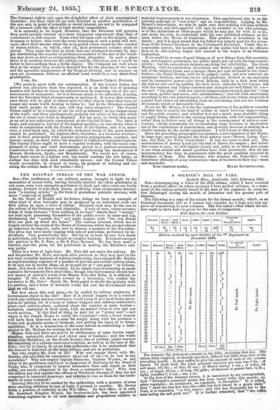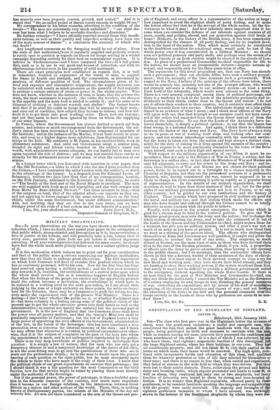A SOLDIER'S BILL OF FARE.
Lesketh How, Ambleside, 16th February 1855. Sm—Accompanying a letter of the 25th ultimo, which I have received from a medical officer on whose accuracy I have perfect reliance, is a state- ment of the rations actually issued to the men of his regiment in camp be- fore Sebastopol during the month of December and the greater part of January. The following is a copy of the return for the former month; which, as an historical document, (for so I cannot but 'consider it,) I hope you may ap- prove of transferring to your columns. The full ration—that which the Bola deer ought to have had—is given for the sake of comparison.
Full Ration for each Soldier.
Biscuit. Fresh Meat. Salt Meat. Rice. Coffee. Sugar. Rum.
Charcoal or
Patent Patel. Light.
lb.
1 lb.
II lb.
1 oz.
2 oz.
1 oz. li gill.
1
lb. li
oz.
2
.Ration received by each Soldier of the** Regiment in December 18H.
Date- Biscuit. Fresh Meat. Salt Meat. Rice. Coffee. Sugar.
Runs.
0-artoal or Patent Pael. Light.
1 2 3 4 5 6 7 8 9 10 11 12 13 14 15 16 17 18
19
20
21 22 23 24 25 26
27
28 29 30 31 -
lb. 1
1 1 1 1 1
1 / 1 1 1 1 1 1 1 1 1
1 1
1
1 1 1
1
1
1
1
1 lb.
it .. .. .. .. ..
.i
i .. .. .. ..
..
..
.. ..
..
..
..
1
..
..
..
1 4
lb.
..
I
14
1 1 1 1 1
a
1
1
1 . 4
oz.
. g .2
A' A
oz. 1 1 1 1 1 1 1 1 1 1 1 1 1 1 1 1 1 1
1
1
1 1 1 1 1
1 1
1 1 1
1
31oz
g •
No Fuel issued.
31 lbs.
416. 13oz. 191b. IOoz.
'54oz _ -
For January the statement extends o the ,
ration daily supplied, as therein specified, differed but little from that of the preceding mouth. It may suffice to give the amount of each of the artiolee issued. Of fresh beef, the total quantity received per man was 8 lbs. ; of salt meat, 181 lbs. ; of rice, 32 ozs. ; of Scotch barley, 1 ozs.; of coffee, 24 ozs. ; of sugar, 42 ozs. ; of rum, 181 gills; of charcoal or patent fuel, It lb.;
light, (candles ?) 2 ozs. ; tea, I oz.
At the foot of the January return, it is mentioned by my, correspondent, that " Edwards's preserved potato has been issued twice this month ; no other vegetable ; no condiment, no vegetable, in December." It is added, that " until the last few days the coffee has been issued in a green state." Fuel, it is remarked, " is very scarce ; and this has frequently led to the men eating the salt pork raw." It is further remarked, that " the coffee
has scarcely ever been properly roasted, ground, and corked." And it is , Mated that "the so-called pound of biscuit rarely exceeds in weight 10 ozs." My correspondent in hie letter remarks, adverting to the condition of the troops—" The men are universally very much enfeebled" : " our chief dis- ease has been what I believe to be scorbutic diarrhcea and dysentery."
He further remarks—" I have officially reported several times that insuffi- cient rations, as well as their quality and imperfect cooking, have been one of the main sources of disease' ; a conclusion the accuracy of which who can doubt ?
Any lengthened comments on the foregoing would be out of place. Even the scale of diet authorized,!were it regularly supplied and properly cooked, is surely open to question as regards its fitness for troops serving in a winter campaign depending entirely for their food on. commissariat supplies. It is inferior in wholesomeness—and I have compared the two—to a full prison diet, such as is in use in our gaols and houses of correction, and with its shortcomings inferior even in the quantity of solid nutriment.
There are exact principles now established as regards diet, it is well to remember, founded on experience of the wants of man, to support his frame in health and strength, and the composition, as determined by analysis, of different qualities of food. The circumstances given of la- bour and exposure and atmospheric temperature, the supply necessary can be calculated with nearly as much precision as the quantity of fuel requisite to produce a certain amount of steam or power in the steam-engine. Who does not know, whether in the instance of man or beast, that the severer the work, the more sustenance is required; the colder the weather, the sharper is the appetite and the more food is needed to satisfy it ; and the same as to thinness of clothing or deficient warmth and shelter ? The farmer knows well that if he stint his cattle in forage they will be unequal to their work ; and once out of condition, how subject they become to disease, and how dif- ficult it is to get them into good working order. These now are truisms ; and yet they seem to have been ignored by those on whom the supplying of our army depends. In France, where the Government has always derived so much aid from science, and science so much encouragement from the Government, the sol- dier's ration has been determined by a Committee composed of members of the Institute; and in the instance of the Marine, it is at least double in quan- tity, and even in a higher degree more salubrious, than that intended for our troops in the field. My authority is M. Payen, in his excellent little work on alimentary substances. And until our Government adopt a similar plan, founded on right and liberal views, founded on the soldier's wants and worth, with administrative means adequate, we can hardly fail to hear over again repeated the tale of distress ; and we may rest assured there can be no security for the permanent success of our arms, or even the existence of our -armies.
In a former letter which you honoured with insertion in your paper, that
of the 23d November,—a letter to which I owe the one I have received from the Crimea,—I have contrasted the sailor's ration with the soldier's, so much to the advantage of the former. In a despatch from Sir Edmund Lyons, off Sebastopol, written two days later than that of my correspondent, namely, on the 27th January, addressed to the Secretary of the Admiralty, he states —" The health of the fleet and of the Naval Brigade is excellent. The men are well supplied with fresh meat and vegetables, and also with oranges sent from Malta by Rear-Admiral Stewart.' Can these accounts be true,—that of the surgeon on land, that of the admiral afloat,—so opposite as they are, and yet applying to forces engaged in the same service, intent on the same object, under the same Government, but under different administration ? And, not doubting that they are true to the very letter, can we have -stronger proof of the evils of a bad system and of the benefits of a good one ?
Inspector-General of Hospitals, H.P.



































 Previous page
Previous page